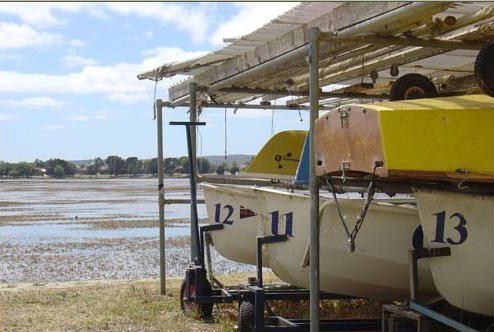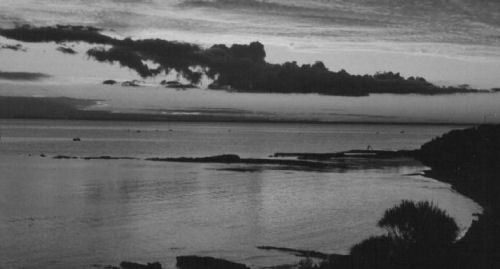Every thing eventually comes to an end, and the long Easter weekend in the southern states usually signals the end of the sailing season.
Often we had boasted that this year we will sail and train through winter, but come those first cold and bleak winter days, other pastimes became much more attractive.
Usually club racing finished the week before Easter, and we were looking at the away-regatta invitations, and so it was at the end of my first sailing season. I had built myself a junior class 8 footer, and an invitation had come from the Ballarat sailing club for an Easter regatta on Lake Wendouree to race against their fleet of 8 footers. I think it was their first post-war regatta. Three boats were interested in going and our only way of getting there was to hire a truck, and load the boats on that. One of our group held a driver’s license, so that was solved.
On arrival at Ballarat we were amused at the local boats. They were heavy planked flat-bottomed boats with wide shallow centre boards and rudders. We were convinced that they would not be hard to beat, as we had longer and more efficient centreboards, and deeper more effective rudders, along with our lighter better shaped hulls.

Lake Wendouree as it is today.
Lake Wendouree was a strange stretch of water. It was about five miles in circumference and long lanes had been cut through the reeds for the rowing and sailing courses. Along the edges were beautiful gardens and lawns. There were even passenger-carrying paddle steamers on the lake.
During the first race we became rather disillusioned. The lake was only three feet deep, and the reeds had been cut off about a foot from the bottom, and even with our centre boards half raised, we were touching the bottom of the reed beds. But we had another problem. Because our centreboards were raised so far, the boom had to be lifted as we went about, or it fouled the plate, and with so many tacks needed to sail up between the rows of reeds, the situation became impossible.
Adding to our discomfort, no one even owned a tent, and we were to sleep under an old tarpaulin.
We had arrived in Ballarat dressed in shorts and short sleeved shirts, a spare jumper, and little else, but we had no idea how cold it could get at night and we ended up jogging around the streets of the town most of the night just to keep warm. The temperature was down to zero.
We had been tricked and it was lesson learnt. In future more care must be taken to find out about local conditions. The invitation we extended to come and race us down on the bay was never taken up.
Some ten years later Lake Wendouree was the venue for the Melbourne Olympics canoeing and rowing events and at that time was a very attractive body of water, but as I write, I believe that it is now no more than a neglected mud hole. What went wrong I do not know.
A year after the Ballarat debacle and another Easter. This time it would be to Frankston in a fourteen footer for their Easter regatta.
Several boats wanted to go to Frankston for their big end-of-year regatta, and the same old problem, no means of transport. At that time there were some thirty boats in the club, and nobody owned a trailer, but someone had the bright idea of sailing the 30 odd miles down the bay on the Thursday night to be ready for the first race on the Friday. The idea was inviting, and the plan was to leave around midnight, and make use of the light north winds that blew overnight at that time of year. That was the normal pattern. Even if it had been blowing during the day from the south-west, it normally faded during the evening, then later the light northerly would set in.
And so we met at the club as planned on the Thursday evening, got the boats out on to the landing and rigged, and went up the street for some dinner, before filling in time by going to the Palais pictures. Around midnight we were off. The light northerly had come in as planned and the Easter full moon was well up in the sky. It was a beautiful night, and quite bright out on the water.
The idea was to stay together but the first boat off put up a spinnaker and was away. We were second, but thought setting a spinnaker at night was risky, and the third boat was still fussing around on the landing when we left. We never sighted the other boats again that night. So much for staying together!
Our navigation aids consisted of a torch and a pocket compass, and we assumed that we knew the bay well enough to know where we were. We had even dug up four life jackets, one for each of the crew. We had reckoned on the sail taking us eight hours if we could average three knots, and expected to arrive at Frankston by 8 AM.
We laid a rough compass course just west of south to start with, and reckoned on a little east of south after four hours, and that should have cleared our only real obstacle which was Rickets Point, and after that it was a sandy beach line all the rest of the way across the Carrum Bight to Frankston.
The only night sailing we had done before was between the St Kilda pier and the club jetty, and that was well lit by the beach lighting.
It is amazing how different things look when you get a little offshore at night. We had planned to be about a mile offshore, and well clear of the piers and crowded foreshore that cluttered the first eight miles.
All went well. It was a beautiful night, and the fluorescence from our wake glowed in the strip of moonlight behind us, but we were really lost within the first hour. The maze of lights along the shore all looked the same, except for one light that appeared high in the sky about three AM.
It was off to our left and seemed to be slowly getting closer and higher. We appeared to be making good speed, and estimated that it was time to start heading a little more east, otherwise we would be getting too far offshore. We seemed to be moving quite fast. Unfortunately the moon disappeared behind the clouds that were moving across from the west, and the night became quite dark. We reckoned on making a steady three knots, and so should be about clear of Rickets Point.
That white light had us puzzled though, it seemed to be moving closer to us, although at night on the water the distance of lights is almost impossible to judge. One of our crew said he could hear water slapping somewhere. It could be a boat with no lights. Come to think of it, we had no lights either, and we started to doubt that we knew what we were doing.
Suddenly there was a grinding noise, and our timber centre board tilted aft, jammed, and the boat swung in to the wind. We had hit a rock about fifty yards from shore, and “that white light” was the light that was there to warn boats of the reef at Rickets Point.
So much for our navigation. We had come ashore exactly where we had gone to so much trouble to avoid.
The sails came down in a hurry and we managed to pull the centreboard out of the case and with relief, paddle back to deeper water. The centreboard wasn’t too badly damaged, only chewed up on the leading edge.

Rickets point lit by a white light on the cliff top but no light to seaward of the reef.
At least it was clear now where we were, and after some discussion managed to get sailing again, although as the sun rose, the wind shifted to the south-west and freshened, so it was a beat all the way now to Frankston. We arrived just on midday, and the trip had taken four hours longer than we had estimated.
After thirty six hours without sleep we slept that night under the sails with the boat laid on its side on the beach and for three nights put up with the cold wet sand. Sand is fine to lay on for a short time, but that hollow that you scraped out to make it more comfortable became impossible when you rolled over.
During the three days the weather had deteriorated and we were faced with an uncomfortable sail home. It was a broad reach and only took six hours but we ended up pumping most of the way. Because of all of the extra gear we were carrying, the boat was low in the water and shipped a lot over the bow.
Our trip had been badly planned, it had been foolhardy, and we had been kidding ourselves regarding our estimated speed and navigational ability.
However when you are young and fit and thirsting for adventure the potential danger and discomfort are the last things on your mind.
Oh and the racing! We were soundly thrashed by our arch enemies the old heavy-weight sharpies. They used their small spinnakers on the very shy reaches, and gave us a lesson in heavy weather sailing. We were to go to Frankston one more year, and this time were given the use of a boat shed to sleep in, but the concrete floor was not much better than the sand, even with a sleeping bag.
Then for the next ten consecutive Easters, it was off to Paynesville in a variety of boats and some of the most enjoyable weekends of my life.